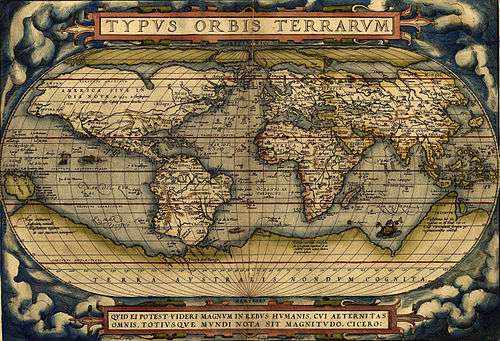Geographer
A geographer is a scientist whose area of study is geography, the study of Earth's natural environment and human society. The Greek prefix "geo" means "earth" and the Greek suffix, "graphy," meaning "description," so a geographer is someone who studies the earth. The word "geography" is a Middle French word that is believed to have been first used in 1540.[1]

Although geographers are historically known as people who make maps, map making is actually the field of study of cartography, a subset of geography. Geographers do not study only the details of the natural environment or human society, but they also study the reciprocal relationship between these two. For example, they study how the natural environment contributes to human society and how human society affects the natural environment.
In particular, physical geographers study the natural environment while human geographers study human society. Modern geographers are the primary practitioners of the GIS (geographic information system), who are often employed by local, state, and federal government agencies as well as in the private sector by environmental and engineering firms.
The paintings by Johannes Vermeer titled The Geographer and The Astronomer are both thought to represent the growing influence and rise in prominence of scientific enquiry in Europe at the time of their painting in 1668–69.
Areas of study
| History of geography |
|---|
 |
There are three major fields of study, which are further subdivided:
- Physical geography: including geomorphology, hydrology, glaciology, biogeography, climatology, meteorology, pedology, oceanography, geodesy, and environmental geography.[[ Note: the Actual Study of Geomorphology, Hydrology, Glaciation, Sedimentology, Volcanology, Stratigraphy, and others are all sub-areas of the Study of Geology. Geography is the Mapping and Interpretation of these physical characteristics as they apply to humans in their environment.]]
- Human geography: including Urban geography, cultural geography, economic geography, political geography, historical geography, marketing geography, health geography, and social geography.
- Regional geography: including atmosphere, biosphere, and lithosphere
The National Geographic Society identifies five broad key themes for geographers:
- location
- place
- human-environment interaction
- movement
- regions[2]
See also
References
- "geography (n.)" (Web article). Online Etymology Dictionary. Douglas Harper. n.d. Retrieved 10 October 2018.
- "Geography Education @". Nationalgeographic.com. 2008-10-24. Archived from the original on 2010-02-07. Retrieved 2013-07-16.
Further reading
- Steven Seegel. Map Men: Transnational Lives and Deaths of Geographers in the Making of East Central Europe. University of Chicago Press, 2018. ISBN 978-0-226-43849-8.
External links
